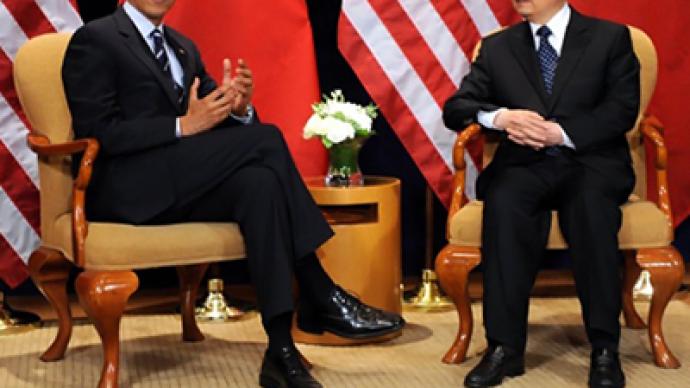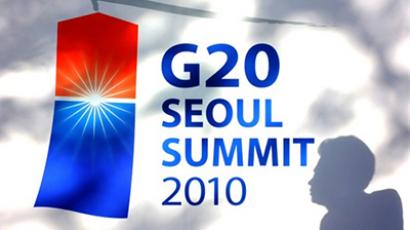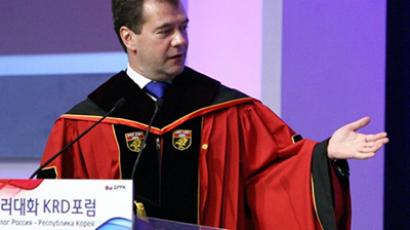Currencies standoff steals show at G20

The G20 has agreed to work to prevent currency wars threatening global trade growth and the world's leading economies have decided to take time-out and discuss fresh solutions in the first half of next year.
After two days of difficult talks, the leaders were able to find a consensus on coming up with early warning indicators to prevent economic turmoil, something that was not the case a couple of years ago when the financial crisis hit.They also agreed to "refrain from competitive devaluation" of currencies, following the tension between China and the United States, which is threatening global trade growth.The two countries accuse each other of manipulating currency rates to make exports cheaper, and build up foreign exchange reserves.The leaders also gave their backing to sweeping reforms designed to give emerging economies a bigger say in the International Monetary Fund.The Russian president said it is vital that these forums and summits take place because it is the way for leaders to find common ground.“Any issue that was raised was carefully considered. The members of the summit have reacted to all of the suggestions made. Overall I can say that world leaders have learned to listen to each other, they’ve started hearing each other,” Dmitry Medvedev said.The G20 has been criticized for being unable to find concrete solutions to global problems. Although the issue of currency wars has not been resolved, it seems it will be discussed further.The American and Chinese presidents sat face-to-face and that was the beginning of some serious dialog. All parties understand that the risk of a currency war is higher than ever. Anger sparked when the US announced plans to drive down the dollar by pumping $600 billion into its economy to try to revive growth – a move that Dean Baker, director of the Washington-based Center for Economic Policy and Research, says is a better option than recession.“We should be spending much, much more,” Baker said. “I don’t understand how [European countries] think that by having austerity they are going to bring about prosperity.”
But charges against the US flared further as it continued demands against China to revalue its Yuan.“China is in a precarious situation with the structure of its banks, its state-owned enterprise system, its inflationary concerns,” said Eric Hagt from the World Security Institute, who suggested that revaluing the US dollar is certain to hurt the Chinese economy. “Without a restructuring of that system… there is a substantial risk to China.”
America is also asking Germany to slow down its tremendously successful export, but Germany understands it does not owe anything to the US. Barack Obama’s statement that what is good for the American economy is good for the world economy was not warmly welcomed at the summit. Some fear the main battles of the currency wars lay ahead, but the Russian president is more positive.“Major economies that are emitting reserve funds still receive signals from each other and agree that it’s unacceptable to manipulate national currencies for the sake of short-term gains. They all understand that balance should be observed,” Dmitry Medvedev said. “Therefore I believe that the threat of a currency war breaking out will significantly decrease following today’s summit. We have reasons to be more optimistic about the future,” he added.“With due respect, I think, President Medvedev is really putting a cosmetic face on irreconcilable differences,” said William Engdahl, economic researcher and author of the book ‘Gods of Money: Wall Street and the Fall of the American Century’, who spoke to RT in Frankfurt.The dollar system that has dominated as the world reserve currency for the last 65 years is in its “death throws”, he said adding that “We are at the beginning of the next wave of crisis that is going to be far more dangerous and instable than the last two years we’ve seen.”“There is no room for a compromise, we are at the break of a new era and the sooner we acknowledge that the better we can get on with the necessary work,” concluded William Engdahl.
Sassan Ghahramani, president and CEO of currency analysts SGH Macro Advisers, believes that the decision to cooperate on prevention of currency wars “means very little for the currency market”. “One of the interesting things that happened at this G20 is that the US was looking for the G20 to be a forum to continue to pressure China and to have a more unified front against China and Asian currencies,” he told RT. “And what it actually ended up turning into is that the US, had to go in there and the tables were turned. The US had actually to explain its own behavior to a whole host of countries.”
“Everybody feels the US is playing currency manipulation but the U.S. does not have a lot of options left on the table,” acknowledged Lida Preyma from the G20 Capital Market Research Group.
“I think there is an awful lot of irony if not hypocrisy in the Chinese reaction,” said David Shore from Stanley Foundation, “China has been buying the U.S. Treasury debt constantly month after month in huge volumes with the exact purpose of keeping their currency weak.”
“There is one surprise. There is not a hint in the communiqué that the leaders [gathered] in Asia recognize that we have a new sovereign debt crisis erupting in Europe, just days before this summit began, with the debts of many European countries really scaring investors around the world,” revealed John Kirton, the director of G8 research group.
“This forum of the G20 is really a means by which individual nations are forced to consider the implications of what they do domestically for the larger stage, for the global scene,” believes Professor Donald Brean from the University of Toronto.
Dr. Viktoria Panova, a political analyst from Moscow State University of International Relations, said she was not very optimistic that the looming currency wars can be stopped. If the participants in the G20 summit fail to reach any substantial agreement, a negative reaction from investors will follow and this could be a real blow to the international economy, Panova said. And the measures the leading countries have already agreed upon are not very effective, the analyst added. However, recent announcements from the US Federal Reserve could help economic recovery if China chooses to listen to advice, Panova said. But if Chinese labor and Chinese goods become more expensive, it would negatively affect consumers all around the world and slow down the economic recovery.
Yaroslav Lissovolik, chief economist at Deutsche Bank, explained why the danger of a currency war has emerged. “The developed countries, especially the US, are running substantial trade deficits while in the developing world you have high savings and high trade surpluses,” he told RT. “In the past 10 to 15 years the developing countries such as China, for example, have been financing the deficits in the developed world. The size of these imbalances kept on growing and growing – and to some degree that has been feeding political strains because that inevitably has given rise to certain protectionist pressures.”














